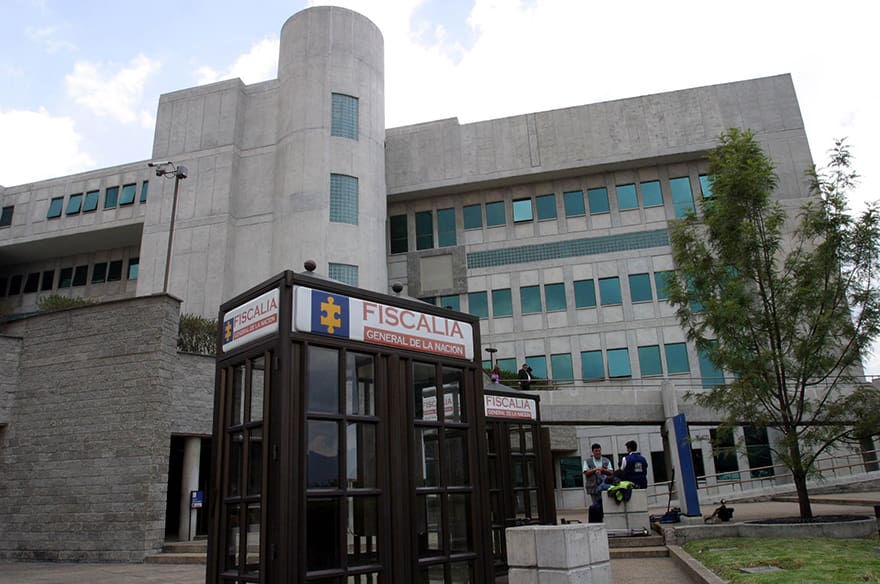IFEX-ALC, Media Defence and Reporters Without Borders (RSF) oppose all acts of intimidation from the Colombia Prosecutor General’s against the Foundation for Press Freedom (FLIP) and the journalist Diana Díaz. They also urge the Colombian authorities to ensure respect for the work of journalists and organizations defending and promoting freedom of expression.
The harassment started in January 2019, when FLIP released audio evidence that Juan Pablo Bieri, then manager of National Radio Television of Colombia (RTVC), a national public media outlet, had given the order to take the “Los Puros Criollos” programme off the air. This came after the programme’s presenter publicly criticized a legislative initiative on information and communications technologies promoted by the government.
After the recording was released, Bieri filed a lawsuit against journalist Diana Díaz, who worked for RTVC as Señal Colombia director and who, in good faith, gave FLIP information on wrongdoings within the institution.
As part of the criminal proceedings brought against Diana Díaz, the Prosecutor’s office required that FLIP advise on a date to carry out a judicial inspection of its offices and any records of people entering FLIP offices between December 2019 and January 2020, and to hand over the audio recording that revealed Bieri’s censorship order. Three staff members from the organization were also called to an interview.
For organizations such as FLIP to do their work, they need the basic guarantee that those who turn to them for support can provide information about violations of the right to freedom of expression and the press without fearing retaliation. The actions of the Prosecutor’s office in this case violate that basic guarantee and have an intimidating effect.
Civil society organizations play a fundamental role in raising awareness, exchanging information, demanding answers, promoting democracy and human rights, and ensuring government accountability. In addition to contributing to a healthy democratic environment, civil society organizations also promote resilient and innovative community responses to health crises, strengthen the voices of marginalized groups and defend human rights.
Just as the UN Special Rapporteur on the right to freedom of peaceful assembly and association has stated, “NGOs can take on roles that political actors aren’t able to, given that these organizations have more possibilities to act independently, impartially and with flexibility. In some cases, civil society groups can also be better connected to community-based groups, are able to maintain confidentiality and have a more trust-filled relationship with the local community.”
For her part, the UN Special Rapporteur on freedom of expression has stated that “often, human rights researchers rely on sources that require confidentiality for safety reasons.” As such, Principle 8 of the Declaration of Principles on Freedom of Expression of the Inter-American Commission on Human Rights (IACHR) establishes that “Every social communicator has the right to keep his/her source of information, notes, personal and professional archives confidential.”
In addition to opposing the harassment of FLIP, we categorically oppose the criminal proceedings brought against journalist Diana Díaz. As a complainant in an issue of public interest, she brought to light a violation of the right to freedom of expression, and, therefore, should receive her rightful protection given international standards on the matter. The criminal proceedings brought against her also have an intimidating effect on other journalists or public officials who, like her, witness acts that constitute violations of human rights.
We, the signatory organizations request:
- That the Prosecutor General’s Office respect the work of civil society organizations and journalists, guaranteeing rights such as the right to source protection, and that it complies with institutional directives on the matter. As such, it should withdraw the charges against journalist Diana Díaz and the proceedings for which FLIP has been summoned.
- That the Prosecutor General’s Office and the Ombudsman’s Office ensure that journalist Diana Díaz’s rights are protected.
- That the president of the Republic sends a strong message of respect for the work of journalists and civil society organizations that defend and promote human rights.
- That the Colombian authorities in general not use the state apparatus to intimidate critical voices.
- That the Colombian authorities in general fulfil the international obligations set out in the human rights instruments ratified by Colombia, which guarantee the full exercise of the right to freedom of expression.
Signatories:
Media Defence
Recent News
Landmark Ruling: Kenya’s High Court Declares Colonial-era Subversion Laws Unconstitutional
Media Defence welcomes the verdict of the High Court in Nakuru, striking down sections of the Kenyan Penal Code which criminalise subversion, citing them as relics of colonial oppression that curtail freedom of expression. Justice Samwel Mohochi, delivering the judgment, asserted that these provisions were overly broad and vague, stifling dissent rather than serving any […]
UN Rapporteurs Call for Protection of Brazilian Journalist Schirlei Alves
UN Rapporteurs Call for Protection of Brazilian Journalist Schirlei Alves Amid Defamation Charges Stemming from Rape Trial Coverage A letter dispatched by UN rapporteurs to the Brazilian Government calls for protective measures for women journalists covering cases of sexual crimes. The letter also denounces the conviction of Brazilian investigative journalist and women’s rights defender, Schirlei […]
Convite à apresentação de candidaturas: Cirurgia de litígio em português na África Subsariana
Cirurgia de litígio em português na África Subsariana Aplique aqui 23 a 25 de julho de 2024 em Nairobi, Quénia Prazo: 3 de maio A Media Defence está a convidar advogados sediados na África Subsariana que falem português a candidatarem-se a participar numa próxima cirurgia de litígio sobre o direito à liberdade de expressão e […]



